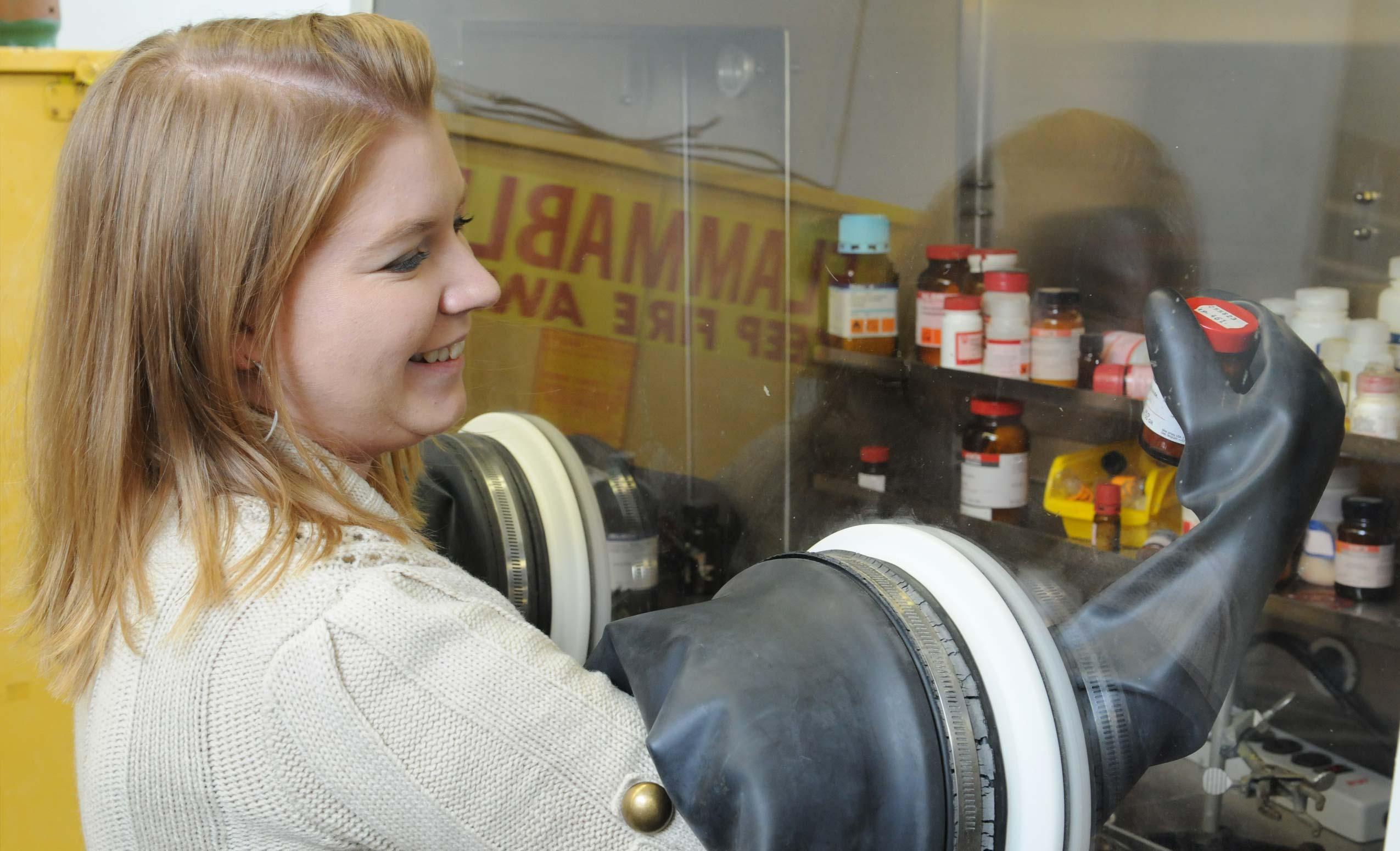Combined skillset
One SUNY Oswego graduate student utilized the skills she learned in two master’s programs to land her dream job.
Joy Logan is a general chemistry lab coordinator and instructional support technician at SUNY College of Environmental Science and Forestry. She prepares the general chemistry lab for the 300+ students enrolled in the general chemistry course each semester.
“My responsibilities are many and varied,” Logan said. “I make sure all the chemical supplies are available and prepared, the lab is safe to use, maintain a balanced budget and make sure the lab can run as smoothly as possible.”
Logan graduated from SUNY Oswego with her bachelor’s degree in chemistry in 2009. She continued her education here as a graduate student in both the chemistry master of arts in teaching program and the chemistry master of science program the following fall semester.
It was as a stockroom assistant during her undergraduate education Logan met Oswego's instructional support specialist, Kristin Gublo.
Gublo prepares the lab for all laboratory courses in the chemistry department and advises the graduate students when they serve as teaching assistants during the chemistry master’s curriculum.
“I have always had a love for organizing and planning, while working with her I realized this job requires those qualities,” Logan said. “I worked with her all through my graduate career. She’s the reason I fell in love with that job.”
Knowing the competitive job market for chemists, Logan began looking through the classifieds during her third semester as a graduate student in December 2010. She applied and was offered the position in February 2011.
Maintaining balance
After taking the position, Logan realized a new problem: How to balance the student teaching requirements of her teaching degree while working in a full-time position.
“I knew the courses [in the MAT] were always going to serve me in the future and they have. They were insightful and they made me think introspectively, in a completely different way.”
“I had a long discussion with [dean of the School of Education] Dr. Pam Michel in her office one day,” Logan said. “She was amazing in helping me with my situation and so supportive.”
Logan ultimately decided not to complete her teaching degree and instead concentrated on her chemistry one, where she could complete course and research work due to the flexibility provided by the chemistry department. However, she found the skills she had learned in education overwhelmingly applied at her new job.
“Although I couldn’t complete the MAT, I knew those courses were always going to serve me in the future and they have,” Logan said. “They were insightful and they made me think introspectively, in a completely different way.”
Logan continues to put her education background to good use. She is helping support the development of a general biology/general chemistry course at SUNY ESF along with developing new general chemistry labs.
Logan also serves as the education chair for the local branch of the American Chemical Society, where she works to promote science education to young people in Syracuse and the surrounding area.
“Those education classes made it easy to talk to children about science on a basic level,” Logan said. “That’s something I’m passionate about, making sure science isn’t thought of as boring or so hard they can’t get it.”
As education chair, Logan helped coordinate events for Syracuse like National Chemistry Week. Around 180 people from the community took part in scientific activities with the assistance of over 50 volunteers in an effort to show science in a different light.
Professors as mentors
During her time as a student, Logan worked closely with Dr. Jeff Schneider and Dr. Casey Raymond in the chemistry department. One of her favorite experiences of the program is that her professors became more than instructors; they also served as mentors.
“They really helped me hone the teaching of chemistry. They were able to give me that insight of how to develop a lab and teach a chemistry concept in a lab,” she said. “Even now, if I can’t figure something out, I can call them.”
The role Logan’s professors played in her education showed her how intertwined chemistry and education can be.
“Teaching is necessary in chemistry. It’s not just doing scientific research,” she said. “Being able to teach that information is vitally important.”
Logan believes that education degrees will continue to be relevant if students are passionate about what they do.
“There are two things that will never go out of style career wise; doctors because we’ll always be sick and educators because we’ll always need to learn,” Logan said. “You have to find that passion. If you’re passionate in education you’ll find a job.”
Logan advises other graduate students in education to do what she has done -- look for opportunities outside traditional teaching careers and use those skills to find a position that you are passionate about.
“There are opportunities outside the typical high school or elementary school teacher,” she said. “The information you learn in those courses isn’t only relevant to teaching children, it’s relevant to everyday life.”




